Dietary Supplements Statistics By Consumer, Region, Demographic, Industry and Type
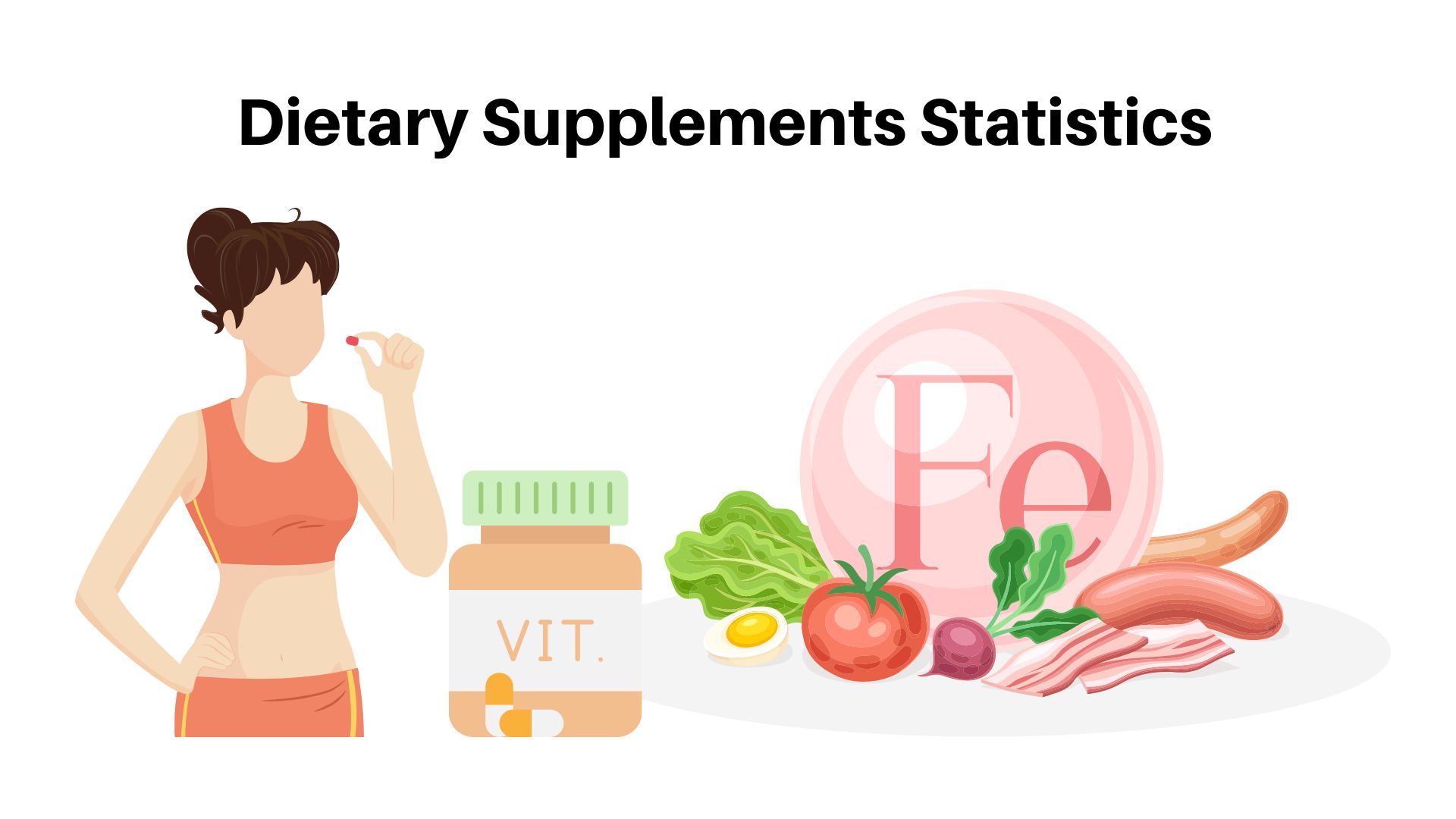
Page Contents
- Introduction
- Editor’s Choice
- General Dietary Supplements Statistics
- Dietary Supplements Statistics By Consumer
- Dietary Supplements Statistics By Region
- Dietary Supplements Statistics By Industry
- Dietary Supplements Statistics By Demographic
- By Race and Ethnicity
- Dietary Supplements Statistics By Type
- Impact of Dietary Supplements on the Economy
- Impact of Dietary Supplements on Health
- Trends and Predictions
- Final Word
Introduction
Dietary Supplements Statistics: Dietary supplements have enjoyed increased consumer demand as people seek to improve their general health and well-being, including vitamins, minerals, herbal extracts, and other ingredients. Due to this high consumer interest, the worldwide market for dietary supplements has seen remarkable expansion; an estimate put at $150 billion in 2022 has since grown into more than $220 billion according to market research; attributed in large part to factors like an aging population, rising health consciousness awareness, and preventive healthcare being responsible.
An increasing portion of society utilizes dietary supplements regularly; 77% of Americans, according to a US poll, regularly take such products. The most commonly taken vitamins are Vitamin D, C, and multivitamins while herbal remedies like Ginseng and Echinacea as well as minerals like Calcium and Iron are also very popular among consumers. Trends show consumer behavior moving toward natural and organic supplements due to increased concerns regarding reliability and security when purchasing items – leading to an increase in demand for items produced using organic sources and without artificial ingredients or preservatives.
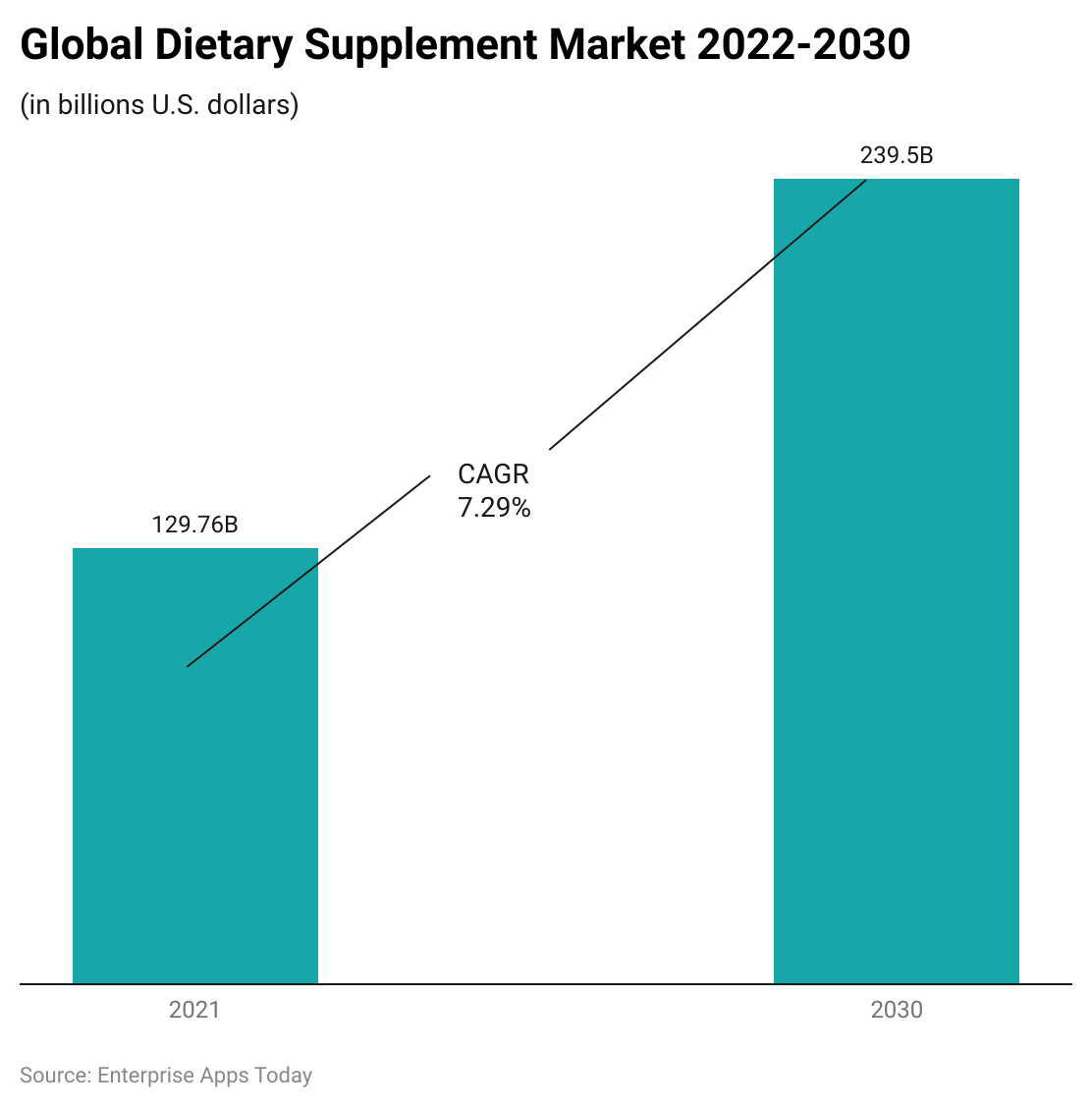
Editor’s Choice
- 77% of American adults currently take some type of supplement.
- A typical American spends $96.50 every time they travel on vitamins and supplements.
- By 2022; the U.S. vitamin and supplement manufacturing market will reach $35.6 billion.
- At an average per-transaction expenditure of $129.58, members of the Greatest Generation spend the highest amounts on supplements.
- Women use supplements at a rate 25.59% higher than males.
- 74% of Americans express concerns that supplements lack scientific credibility.
- By 2024; it's estimated that the U.S. market for dietary supplements will have reached $56.7 billion.
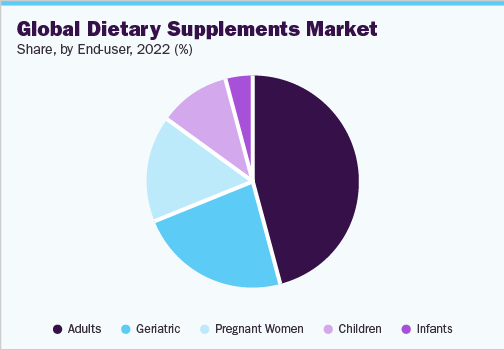
(Source: grandviewresearch.com)
General Dietary Supplements Statistics
Dietary supplements have grown increasingly popular globally as individuals seek ways to enhance their overall health and well-being.
- In 2022, it was estimated that the market for dietary supplements would reach an estimated total value of roughly $150 billion; by 2027, this number is projected to surpass $220 billion. By this estimate, approximately 76% of individuals in the US admitted to taking such supplements.
- Vitamin D, C, and B are among the most widely taken dietary supplements among American citizens – more than half do so daily!
- Calcium, magnesium, and iron are three popular mineral supplements. Herbal and botanical remedies made from actual plants or plant extracts have become increasingly popular – Ginseng, Echinacea, and Turmeric are three such examples.
- Consumers are becoming increasingly wary about the source, quality, and safety of nutritional supplements.
- There is an ever-increasing market for natural and organic supplements derived from plant sources that do not contain synthetic additives and preservatives.
- Many individuals rely on dietary supplements as part of their overall wellness plan.
- By 2023, it is expected that the U.S. market for vitamins and minerals would generate $4.06 billion in sales revenue.
- With an expected compound annual compound growth rate of 9.5% between now and 2026, beauty supplements represent one of the fastest-growing markets worldwide.
- As people seek to maintain good health and cope with age-related concerns, the market for dietary supplements continues to expand as people age.
- Dietary supplements are often utilized by athletes and fitness enthusiasts in order to boost performance, facilitate recuperation, and meet nutritional requirements.
- Dietary supplements are often utilized to address nutritional deficiencies in an individual's diet, particularly when specific vitamins are missing from them.
- Multivitamin supplements have become increasingly popular over time as they provide essential vitamins and minerals in one convenient product.
- Though their effectiveness and safety may differ depending on each supplement's formulation, certain dietary supplements have become popularly advertised for weight management.
- Different nations have different laws regarding dietary supplements. Although in other nations they may fall under health product rules, in the US they are considered food.
- Before embarking on any supplement regimen, it is advisable to speak to a healthcare provider, particularly if you have a preexisting medical condition or take medications that could interact negatively with supplements.
Dietary Supplements Statistics By Consumer
Here are some figures on dietary supplements from a consumer standpoint.
- Certain demographic groups tend to utilize nutritional supplements more frequently. Nutritional supplement usage is most prevalent among older persons, those with higher incomes; and individuals who possess a greater level of education.
- As opposed to men, women tend to consume dietary supplements more frequently due to being pregnant and thus needing them for health purposes and pregnancy-related needs.
- Consumers use dietary supplements for various reasons, with the main drivers including improving general health and well-being, compensating for any dietary deficiencies, increasing energy levels; improving immunity function, and supporting specific medical problems.
- Vitamins and minerals are among the most frequently taken dietary supplements. People take these pills either to support health needs or address deficiency issues.
- People often self-diagnose diseases or self-treat symptoms with dietary supplements. It's important to keep in mind, though, that self-diagnosis might not always be reliable; in order to ensure an accurate diagnosis and course of treatment you should seek professional medical guidance.
- Consumers searching for information regarding dietary supplements often rely on various sources, including product labels, friends and family recommendations, healthcare providers, and internet databases. When gathering this data it's essential that users critically assess its accuracy.
- Though nutritional supplements are typically seen as non-hazardous, unintended side effects may arise if taken in excess or with certain drugs. Consumers must use supplements appropriately and be informed about potential adverse reactions.
Dietary Supplements Statistics By Region
North America
- Dietary supplement use is extremely prevalent across North America with over 76% of individuals reporting supplement use.
- Opinions may differ on this matter, but many Canadians also utilize dietary supplements.
Europe
- European nations vary considerably in their consumption of dietary supplements, with Germany, Sweden, and the Netherlands seeing particularly high consumption levels for them.
- Omega-3 fatty acids; vitamins; and minerals are among the most frequently taken nutritional supplements in Europe.
Asia-Pacific
- With an emphasis on health and well-being, Japan boasts an established dietary supplement industry with an array of conventional herbal products as well as supplements available on the market.
- Due to rising disposable incomes and greater health awareness, China's dietary supplement industry has experienced spectacular growth.
South America
- Dietary supplements are increasingly popular in Australia, particularly among those looking to address nutritional deficiency or achieve certain health objectives.
- Given factors like its rising disposable incomes and emphasis on preventative healthcare, Brazil boasts an expansive market for nutritional supplements.
- Mexico and Argentina experience high sales of dietary supplement items designed to support general health and well-being. Customers in both countries tend to look for items that improve overall health and well-being.
Arab and African Worlds: two interlinked systems
- Dietary supplement use has increased substantially across the Middle East due to factors like an increasing interest in preventative healthcare and an emphasis on fitness and well-being.
- Africa is home to numerous nations and regions which rely heavily on natural remedies and herbal medicines as part of their diet and medicine regimens.
Different Regions
- Certain regions experience high prevalence rates of dietary supplement use. For instance, India has long been known for the use of herbal medicines and Ayurved supplements for both medicinal and nutritional reasons.
- Dietary supplements are widely consumed in South Korea, often to support skin health and enhance appearance.
Dietary Supplements Statistics By Industry
Industry Size
- In 2022, it was estimated that the global dietary supplement market was worth $150 billion; by 2027 it is projected to surpass $220 billion in value.
- North America and Europe are home to two of the world's biggest markets for dietary supplements, representing nearly 40% of worldwide sales combined.
Merchandise Categories
- The primary product categories within the dietary supplement industry are vitamins and minerals, which represent a substantial share of its revenue stream.
- Herbal and botanical supplements, sports nutrition supplements, and products that specifically target particular medical issues are other product groups available to consumers.
Distribution Methods
- Pharmacies, health food shops, supermarkets, online retail sites, and direct sales are some of the channels used by the dietary supplement industry for the distribution of their products.
- As online purchases of nutritional supplements have grown increasingly more convenient and provide access to more items, their popularity has steadily grown.
Key Players
- The global market for dietary supplements is highly competitive, featuring numerous producers and suppliers.
- Amway, Herbalife Nutrition, Pfizer Inc, Abbott Laboratories Bayer AG, and Nestle SA are among the numerous companies operating within this sector.
Consumer Preferences and Trends
- Consumers increasingly favor natural and organic nutritional supplements derived from plant sources as an alternative to chemically produced ones.
- Consumers are increasingly interested in customized nutrition, searching for dietetic supplement solutions tailored specifically to their health requirements and genetic profiles.
- As more customers opt for eco-friendly supplements, sustainability, and ethical sourcing procedures have become more vital.
Regulatory Environment
- Different nations have different laws when it comes to dietary supplements. In the US, however, the Dietary Supplement Health and Education Act (DSHEA) governs this market.
- Under the Food Supplements Directive (FSD) and Nutrition and Health Claims Regulation (NHCR), the European Union has put into effect regulations for labeling, safety, and health claims associated with dietary supplements.
- Other countries have their own regulatory frameworks in place to guarantee the quality, safety, and proper labeling of dietary supplements.
Investigation and Innovation
- Dietary supplement markets make investments in research and development to develop cutting-edge products that meet rapidly evolving customer requirements.
- To examine the efficacy and safety of dietary supplements, research partnerships are established with universities; clinical trials are performed, and academic studies are conducted.
Dietary Supplements Statistics By Demographic
Age
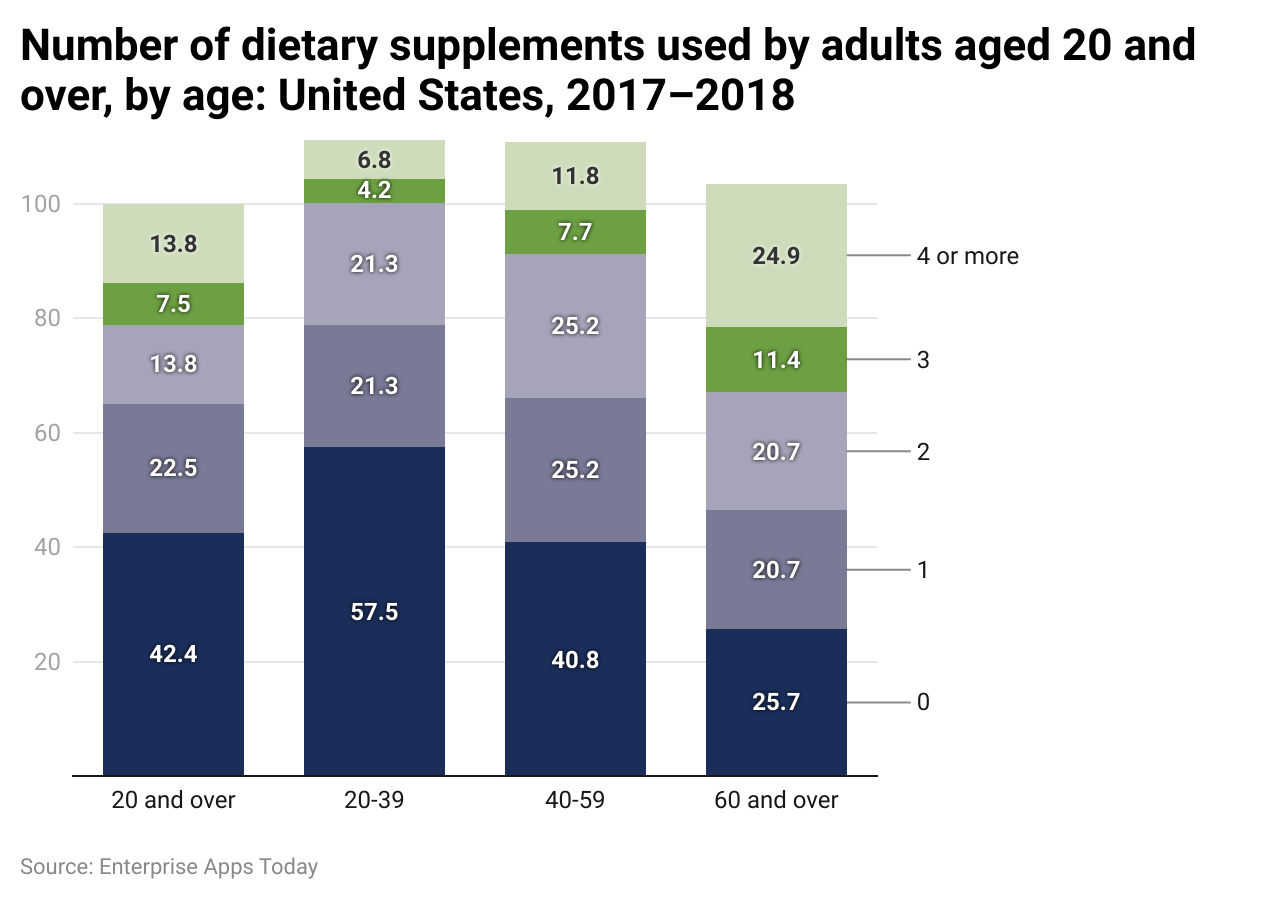
(Reference: cdc.gov)
Millennials (18 to 34):
- Young adults are becoming more interested in nutritional supplements due to health and fitness trends and fads as well as an overall desire for improved health.
- At this age range, multivitamins, protein powders, and sports nutrition supplements are frequently taken.
- 25% of American adults take both prescription drugs and nutritional supplements simultaneously.
Adults aged (35-54):
- Middle-aged individuals frequently turn to nutritional supplements to manage stress, maintain overall health and treat particular aging-related medical issues.
- At this age range, supplements including omega-3 fatty acids, vitamin D, and joint support pills are commonly consumed.
(55+) Older Adults:
- Due to increased nutritional needs and higher rates of certain health problems among elderly individuals, dietary supplements may often become part of their routine care.
- Omega-3 fatty acids for cardiovascular health, calcium for bone health, and vitamin D for cognitive support are widely consumed supplements by older individuals.
Children and Teenagers:
- Parents' decisions and specific health concerns often act as the catalyst behind children and teens consuming dietary supplements.
- Multivitamins, vitamin D, and omega-3 fatty acid supplements are widely utilized by children of this age range.
Seniors (65+) Population:
- Because of age-related health concerns, independence concerns, and an emphasis on preventative healthcare, older populations typically utilize dietary supplements more frequently.
- Elderly adults frequently take supplements including calcium, vitamin D, B vitamins, and probiotics.
Gender
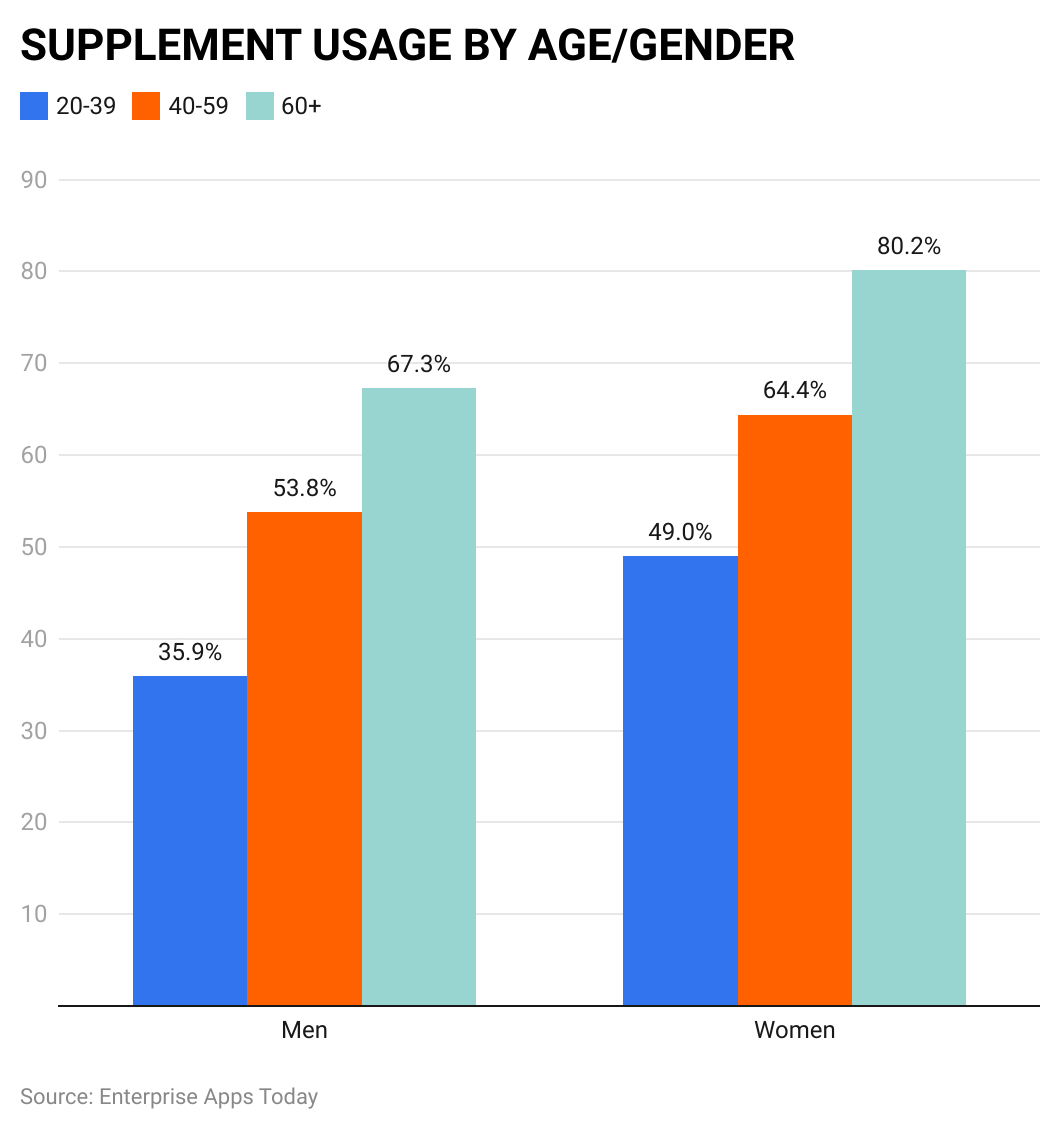
(Reference: zippia.com)
Women and Their Supplement Use.
- Dietary supplements tend to be consumed more often by female consumers due to various reasons, including health needs and life stages specific to female users.
- Women typically take prenatal vitamins in order to support fetal development and meet their increased nutritional requirements while pregnant.
- Women often take supplements related to attractiveness, fertility, and bone health (such as calcium and vitamin D).
Utilization by Men.
- Although males traditionally consume dietary supplements less frequently than women, this trend is becoming increasingly apparent.
- Men often turn to supplements for help in improving their overall health, muscle growth, and athletic and fitness performance.
- Protein powders, creatine, omega-3 fatty acids, and sports nutrition supplements are widely popular among males.
- Due to their purported health advantages, several supplements are only marketed to one gender. Men may be targeted by supplements promoting prostate health while women typically benefit from products providing menopausal support.
- Women may rely on supplements in order to keep their hormones balanced during different life stages, such as menopause or menstruation.
- Men can take supplements to support healthy prostate function and testosterone levels.
- Annual American expenditure on weight reduction pills exceeds $2.1 billion.
- 21% of women and 10% of men in the US have tried weight-loss pills.
- Women use iron supplements at a 112% higher rate than males.
- Men and women may have different health goals and considerations that influence which supplements they choose to take.
By Race and Ethnicity
Non-Hispanic Whites:
- Non-Hispanic Whites tend to use more dietary supplements than other racial and ethnic groups within the US.
- Attributed to improved access to healthcare, increased income levels, education levels, and income.
Hispanics or Latinos:
- As a result of factors such as acculturation, education, and increasing health consciousness among Hispanics and Latinos, the use of dietary supplements is steadily rising among this demographic.
- Multivitamins, omega-3 fatty acids, and herbal treatments are among the many supplements frequently utilized today.
American-African
- African Americans typically take fewer dietary supplements than other racial and ethnic groups, typically for weight management.
- Natural and herbal supplements sourced from African traditional medicine have seen increasing popularity.
American Asians
- Due to the different cultural backgrounds of Asian Americans, their use of dietary supplements may differ.
- Asian American cultures typically incorporate conventional vitamins and minerals, traditional Chinese medicine, and Ayurvedic supplements into their lifestyles.
Native American:
- Native American populations; have long used natural products and traditional herbal treatments; for health and well-being purposes.
- These societies may frequently utilize herbal-based supplements made of plants such as ginseng or echinacea for relief.
Dietary Supplements Statistics By Type
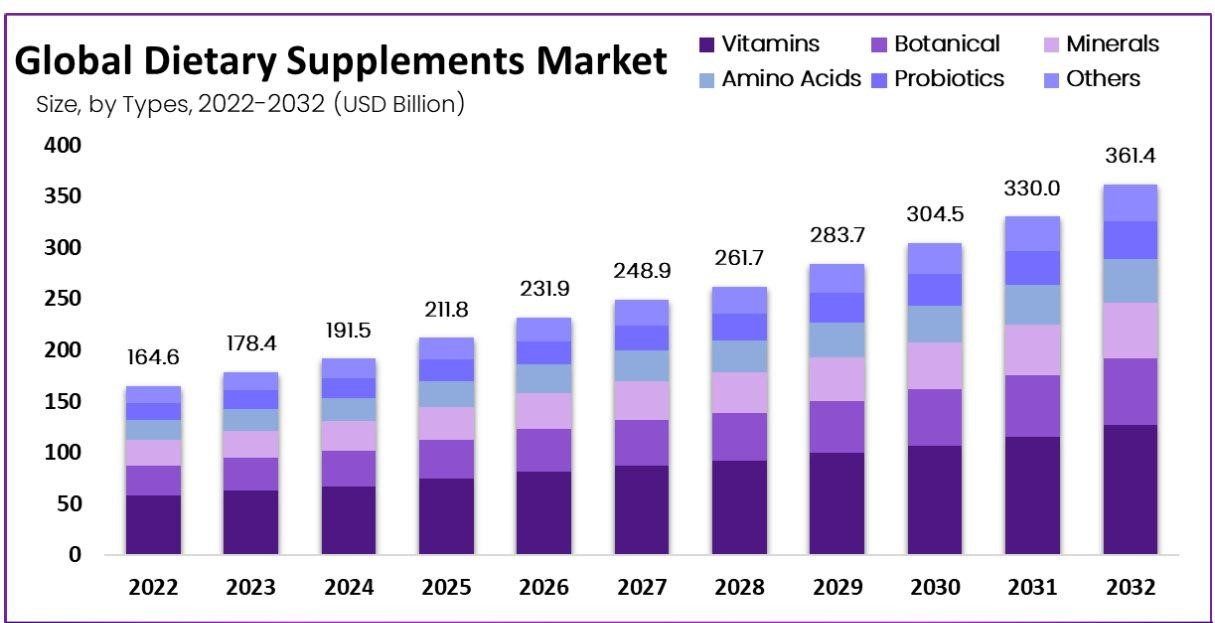
(Source: Market.us)
Minerals and Vitamin Supplements:
- Nutritional supplements that are widely consumed around the world include vitamins and minerals.
- Multivitamins and single-nutrient supplements are among the most widely available choices in the US.
- Vitamin D is the most widely purchased nutritional supplement in the US, with 66% of shoppers purchasing it.
- According to a survey, vitamin D, C, and calcium supplements are the ones most frequently taken by Americans.
Supplements made from herbs and plants:
- Consumers looking for natural alternatives have become increasingly intrigued with herbal and botanical supplements made from plants or plant extracts.
- Garlic, ginseng, turmeric, and echinacea are some of the most widely consumed herbal supplements.
- Sales of CBD supplements experienced an incredible surge, jumping by 422% between 2017 and 2022.
- Herbal and botanical supplements comprised the majority of sales in the US.
Omega-3 Fatty Acids with Fish Oil:
- Fish oil supplements containing omega-3 fatty acids are often taken due to their potential health benefits.
- Omega-3 fatty acids have been linked with improved inflammation control, cognitive function, and cardiovascular health.
- A survey discovered that fish oil/omega-3 supplements were the most popular specialized supplement category in the US.
Probiotics:
- Probiotics are microorganisms that aid in maintaining an ideal population of gut flora.
- Probiotic supplements containing Lactobacillus and Bifidobacterium strains are often taken to promote digestive health.
- Over the coming years, it is expected that the probiotics industry would experience considerable expansion globally.
Supplements for athletic nutrition:
- Athletics and fitness fanatics commonly utilize sports nutrition supplements.
- Supplements such as protein powders, creatine monohydrate, BCAAs, and pre-workout supplements are often taken to boost athletic performance, muscular development, and recovery.
- An astounding 41.7% of collegiate athletes use protein supplements versus just 5.7% who utilize caffeinated multivitamins.
- Recent years have witnessed an exponential surge in sales of nutritional supplements tailored specifically for athletes.
Specialty Supplements:
- Supplements geared specifically toward specific health issues or ailments are the focus of specialty supplements. Examples include glucosamine and chondroitin for joint health, omega-3 fatty acids, and ginkgo biloba for cognitive support, and lutein/zeaxanthin for eye health.
- Aim to meet specific health demands, specialty supplements are used as part of an overall healthcare strategy.
Supplements to aid weight management:
- People looking to regulate their body weight often resort to weight management supplements for weight reduction or increase.
- These supplements could contain conjugated linoleic acid (CLA), Garcinia cambogia, or green tea extract as key ingredients.
- Supplements designed to aid weight loss have seen rapid expansion on the market.
Impact of Dietary Supplements on the Economy
Dietary supplement markets exert a powerful impact on global economies.
- The dietary supplement sector contributes to global job creation by providing employment prospects and creating jobs globally. It comprises numerous industries including production, R&D, marketing distribution, and retailing.
- Many individuals are employed by large and small companies within this sector, providing livelihoods and economic advancement for many people.
- Nutritional supplement production involves an intricate supply chain that encompasses procuring raw ingredients, formulation, production, packaging, and quality control.
- As manufacturers produce various dietary supplements to meet customer demand, this industry generates income and job opportunities.
- Dietary supplements can be purchased through numerous retail channels such as pharmacies, health food shops, supermarkets, internet marketplaces, and direct selling. The retail and distribution industries related to dietary supplements contribute significantly to economic development by providing jobs and making money.
- Dietary supplement market investment in research and development to create novel products and enhance existing formulas is made. Scientific studies, clinical trials, and research partnerships all advance this sector and help create innovation as well as economic prosperity for its industry participants.
- Dietary supplements have become one of the fastest-growing industries worldwide. International trade and export-import operations play an integral role in their sale.
- Countries like the US, China, Germany, and Japan that boast significant dietary supplement industries sell their goods into multiple markets around the globe to foster global commerce and economic cooperation.
Impact of Dietary Supplements on Health
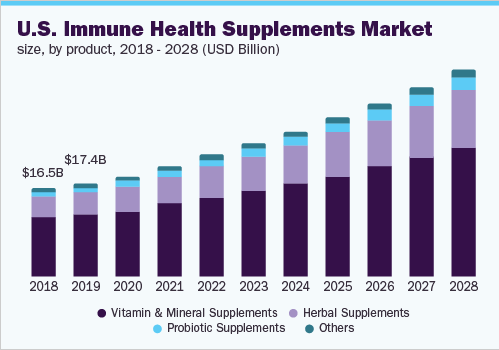
(Source: globenewswire.com)
Researchers and health practitioners continue to explore and assess the effects of dietary supplements on health. While taking them may provide benefits when taken properly, it's essential that their potential advantages and disadvantages be carefully considered before making your decision.
- Supplements may be helpful when people do not have easy access to food rich in vitamins. When this occurs, taking vitamin supplements can help make up for any gaps.
- Dietary supplements may assist certain populations, including pregnant women and older individuals; address vitamin deficiencies. According to the Centers for Disease Control and Prevention (CDC), some dietary supplements have proven helpful when used in combination with other medical therapies for specific medical issues.
- Omega-3 fatty acids may reduce the risk of cardiovascular disease, while folic acid supplements may prevent birth abnormalities. Calcium and vitamin D supplements may improve bone health.
- Some nutritional supplements may pose potential dangers or have potential side effects when taken in high doses or when combined with specific drugs.
- National Poison Data System recorded over 26,000 adverse effects related to dietary supplements during one year alone, underlining their importance. Prudent use is thus important.
- Dietary supplements vary significantly in terms of their efficacy and safety, compared with pharmaceutical drugs. As a result, the U.S. Food and Drug Administration (FDA) exerts less oversight over nutritional supplement regulation.
- Dietary supplements and prescription drugs may interact in ways that reduce or impede their effectiveness, leading to side effects or adverse interactions for either.
- Studies conducted and published by the Journal of the American Medical Association indicate that over 20% of older individuals taking prescription drugs also consumed dietary supplements that could pose potential interactions.
- There is little or conflicting data supporting the effectiveness of many dietary supplements, while the Dietary Supplement Health and Education Act of 1994 (DSHEA) permits marketing without FDA premarket approval, further contributing to an absence of regulation and monitoring.
Trends and Predictions
Dietary supplements have experienced significant advances, and projections can be made based on changing consumer tastes and market dynamics.
- Demand for nutritional supplements made of all-natural, clean-label ingredients free from artificial chemicals and allergies is increasing exponentially. Organic, non-GMO and sustainably sourced ingredients are being increasingly integrated into more products.
- Consumer demand for transparency in product labeling and origin is expected to drive this trend, while personalized nutrition continues to gain in popularity as businesses now offer tailored supplements based on individual customer requests, health goals, and genetic profiles.
- Technology innovations such as DNA testing and wearable gadgets provide personalized recommendations, prompting the creation of tailored dietary supplements.
- Consumer interest in immunological health and well-being has skyrocketed as a result of the COVID-19 epidemic, sparking significant consumer interest in immune-enhancing supplements like probiotics, zinc, elderberry extract, and vitamins C & D. There has also been significant demand for these dietary aids from pharmaceutical companies.
- Even after the epidemic is over, immunological support will still need to be prioritized.
- Within the dietary supplement market, customers are giving sustainability more thought than ever.
- Businesses are adopting sustainable production methods, ethical sourcing strategies, and eco-friendly packaging in response to rising consumer demand for ecologically friendly supplements. Businesses give sustainability initiatives top priority as consumer demand rises.
- Due to the proliferation of e-commerce platforms, dietary supplements are now more readily accessible to customers than ever. Both direct-to-consumer businesses and online retail platforms have experienced significant expansion.
- Predictions indicate that the sector will undergo further digitalization with increasing online marketing, product education, and customized Recommendations.
- Veganism and its trend toward plant-based diets have led to an explosion in demand for vegan and plant-based dietary supplements, especially omega-3 fatty acids derived from algae, plant-based proteins, and vegan-friendly formulas.
- As customers increasingly opt for products made from plants and ethical, environmentally-friendly brands, this trend is expected to persist. Furthermore, stress management and mental wellness have gained much wider recognition.
- Dietary supplements that specifically target stress reduction and mood support with ingredients like adaptogens, herbal extracts, and vitamins are growing increasingly popular.
- As consumers place more importance on holistic wellness, the demand for supplements that promote mental wellness should increase accordingly.
Final Word
Dietary supplements play a significant role in people's lives, providing a vast selection of items designed to address various health needs. Dietary supplement data provide insights into consumer preferences, industry dynamics, and emerging trends; overall the market for dietary supplements is worth billions and continues to expand significantly; with consumers increasingly turning to supplements as ways to enhance general health; address nutritional deficiencies or address particular issues; specialty goods, herbal supplements, vitamins and minerals available represent just some of the options customers have available to them.
Age; gender; ethnicity and location can all play a factor in supplement use. Overall there is an increasing interest in natural; tailored immune-enhancing supplements even if different groups may have differing tastes for them. Future developments for this sector's development include personalized nutrition; sustainable practices and digitalization; with increased attention being given to mental health and well-being. These trends reflect shifting consumer preferences; for transparent labeling; eco-friendly sourcing and comprehensive health care. But people must exercise extreme caution when using dietary supplements and seek medical advice when making educated decisions or following rules in order to ensure their safety and effectiveness.
Sources
FAQ.
Even though your diet remains healthy after discontinuing vitamin supplements, your body becomes less effective at absorbing them from food sources and you risk vitamin deficiency. Take caution if taking vitamins; often these products cause nutritional imbalances which contradict what was promised!
While many prescription medications and dietary supplements contain natural ingredients, this doesn't always guarantee safety. For instance, although the kava plant belongs to the pepper family, taking its supplements could damage liver tissue.
Of course, there's such a thing as too much of anything good, including food and supplements; too much may have serious adverse consequences. While water-soluble vitamins don't need to be supplemented daily due to being stored in your liver.
Vitamin, mineral and herbal (sometimes referred to as botanical) supplements are common examples of dietary supplements used by many individuals to maintain or improve their health or ensure they're getting enough essential nutrients in their diets. Not everyone requires dietary supplements, however - just some do!

By conducting scientific research, I write about illness, health and healthcare. As a professional medical writer, my experience includes creating feature articles for newsletters and websites as well as research news stories for doctors and researchers. Reading has been an integral part of me since childhood - I'm fan of "Friends" and the "Harry Potter series". Before this career, I was employed by a French multinational company. However, my passion for reading led me to pursue writing professionally; my first Amazon-published short story entitled "The envelope that changed our lives" has recently been released. In my free moments, I enjoy long bike rides around town.